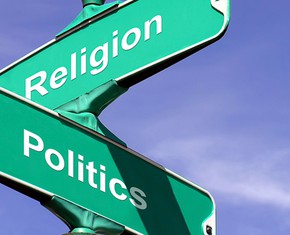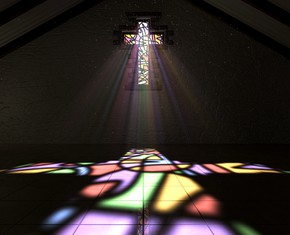The views expressed in our content reflect individual perspectives and do not represent the authoritative views of the Baha'i Faith.
No breeze can compare with the breezes of Divine Revelation, whilst the Word which is uttered by God shineth and flasheth as the sun amidst the books of men. – Baha’u’llah, Epistle to the Son of the Wolf, p. 42-43.
Throughout my life I’ve had an abiding interest in those breezes of divine revelation, and have focused my attention on all things mystical.
In fact, my grandmother once told me that I used to take her hand, pull her into the nearest empty room, close the door and say “OK, now let’s talk about God.” That started, she said, when I was four.
I have no idea how I developed that kind of intense interest at such an early age. My family wasn’t particularly religious—my Dad was a lapsed Lutheran and an atheist who scoffed at most religion and didn’t like the clergy much, either. My Mom, raised a Catholic, had left the Church at a young age, convinced that it justified psychological and physical abuse. Only my grandmother, bless her tender heart, had a deep sense of faith. Her beliefs weren’t restricted to any one church or system, though—she just lived a strong commitment to the kindness and love she found in the Old and New Testaments.
So maybe that background explains why I’ve always felt the words “final” and “religion” should never be used together in a sentence. When I discovered the Baha’i Faith as a teenager, that was my first question: Is this Faith final?
I’ll never forget the answer my Baha’i friend and teacher Art Jess replied with: “No religion is final,” he said. “They’re all part of an ongoing progressive revelation from one God.” That answer gave my inner skeptic the permission I needed to investigate further, and I became a Baha’i three years later.
Later, I looked into that whole finality question, because I kept meeting people who insisted that their religion—whether Hindu, Buddhist, Christian, Muslim or many others—was the final word in faith.
I learned that Baha’u’llah specifically cautioned “people of insight” not to allow their devotion to one religion to blind them to the validity and truth of others. Interpreting their own faith as final, Baha’u’llah wrote, “hath… been a sore test unto all mankind.” (The Book of Certitude, p. 162.) Actually, the Baha’i teachings say that this tendency—to insist that my religion is right and final, and yours is therefore wrong or invalid—has caused enormous grief, strife and pain throughout history. Baha’u’llah said, instead, that all the Prophets of God represent the same essence:
If thou wilt observe with discriminating eyes, thou wilt behold them all abiding in the same tabernacle, soaring in the same heaven, seated upon the same throne, uttering the same speech, and proclaiming the same Faith. – Ibid., pp. 153-154.
Then I discovered that Shoghi Effendi, the Guardian of the Baha’i Faith, did use the words “final” and “religion” together in a sentence—when he had these strong words to say about the subject:
The Faith standing identified with the name of Baha’u’llah disclaims any intention to belittle any of the Prophets gone before Him, to whittle down any of their teachings, to obscure, however slightly, the radiance of their Revelations, to oust them from the hearts of their followers, to abrogate the fundamentals of their doctrines, to discard any of their revealed Books, or to suppress the legitimate aspirations of their adherents. Repudiating the claim of any religion to be the final revelation of God to man, disclaiming finality for His own Revelation, Baha’u’llah inculcates the basic principle of the relativity of religious truth, the continuity of Divine Revelation, the progressiveness of religious experience. His aim is to widen the basis of all revealed religions and to unravel the mysteries of their scriptures. He insists on the unqualified recognition of the unity of their purpose, restates the eternal verities they enshrine, coordinates their functions, distinguishes the essential and the authentic from the nonessential and spurious in their teachings, separates the God-given truths from the priest-prompted superstitions, and on this as a basis proclaims the possibility, and even prophecies the inevitability, of their unification, and the consummation of their highest hopes. – The Promised Day is Come, p. 108.
We’ve certainly reached the age of evolution and relativity in science, so why not in religion, too? “Baha’u’llah inculcates the basic principle of the relativity of religious truth,” Shoghi Effendi wrote. You might call this powerful concept the religious theory of evolution, because it categorically denies that any religion is final by saying that all religion forms a single, progressive, constantly evolving system:
…it is evident that God has destined and intended religion to be the cause and means of cooperative effort and accomplishment among mankind. To this end He has sent the Prophets of God, the holy Manifestations of the Word, in order that the fundamental reality and religion of God may prove to be the bond of human unity, for the divine religions revealed by these holy Messengers have one and the same foundation. – Abdu’l-Baha, The Promulgation of Universal Peace, p. 338.
When we begin to recognize the commonality, the unity and the truth that underlies every great Faith, like my grandmother instinctively did, we begin to understand that the static idea of finality can never apply in an ever-evolving system. Just as the inter-generational process of physical evolution ensures that no final version of reality can ever exist, progressive revelation also guarantees that the Word of God will never exhaust its meanings or appear in any ultimate version.
Next: The Word of God: for Agreement and Concord
















Comments
Sign in or create an account
Continue with Googleor